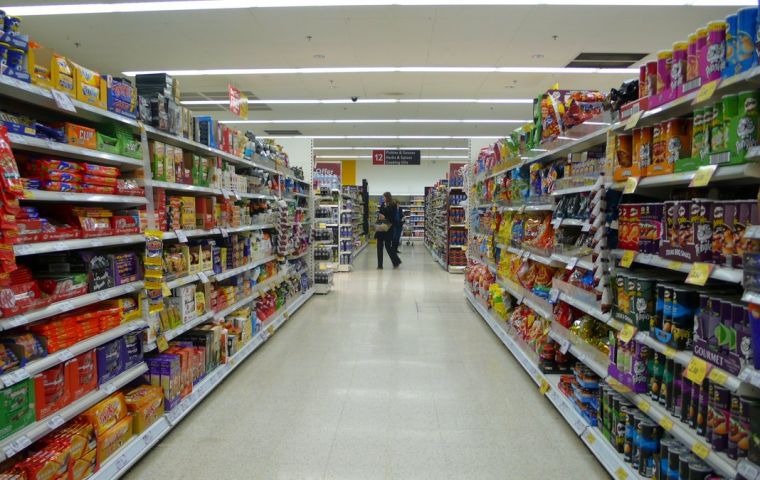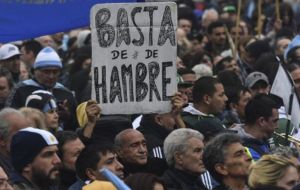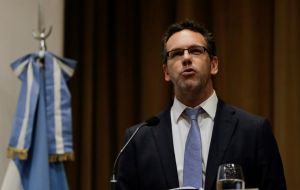MercoPress. South Atlantic News Agency
Argentina's inflation 54.7% in 12-months; more monetary “contraction measures” and support from IMF
 The recession-hit country's consumer prices rose 4.7% for the month, taking the quarter increase to 11.8%, and 54.7% in 12-month. INDEC said
The recession-hit country's consumer prices rose 4.7% for the month, taking the quarter increase to 11.8%, and 54.7% in 12-month. INDEC said  Latin America's No. 3 economy has also been hit by broader financial turmoil that has left a third of the population in poverty and forced interest rates upward
Latin America's No. 3 economy has also been hit by broader financial turmoil that has left a third of the population in poverty and forced interest rates upward  Argentine central bank chief Guido Sandleris said in a press conference after the data that the bank believed the pace of inflation would start to ease from April.
Argentine central bank chief Guido Sandleris said in a press conference after the data that the bank believed the pace of inflation would start to ease from April. Argentina's inflation rate accelerated for the third straight month in March, the government statistics agency said on Tuesday, prompting the central bank to unveil fresh measures to temper raging inflation and protect the embattled peso currency.
The recession-hit country's consumer prices rose 4.7% for the month, taking the year-to-date increase to 11.8%. Rolling 12-month inflation is running at 54.7%, the National Institute of Statistics and Censuses (INDEC) said.
“That's a very bad number,” said Alberto Bernal, chief emerging markets strategist at XP Investments in New York, adding it would force the country's central bank to keep already-sky-high rates elevated to help protect the peso currency.
Argentina has been taking measures to fight inflation since last year, when prices rose 47.6%, battering consumers' spending power and dampening President Mauricio Macri's popularity ahead of make-or-break national elections later this year.
Latin America's No. 3 economy has also been hit by broader financial turmoil that has left a third of the population in poverty, forced interest rates upward and sent the beleaguered peso currency tumbling against the dollar.
Argentine central bank chief Guido Sandleris said in a press conference after the data that the bank believed the pace of inflation would start to ease from April.
He added the central bank would reinforce the “contractionary bias” of monetary policy, which includes freezing a non-intervention peso trading range until year-end and holding off from buying dollars to rein in the currency if it strengthens outside the range until the end of June.
The bank had bought nearly US$1 billion at the start of the year to help bring the currency back inside the range.
The International Monetary Fund said it welcomed the central bank's announcements.
“We are confident that continued efforts in this direction will help to bring inflation down in the coming months,” IMF spokesman Gerry Rice said in a tweet.
Goldman Sachs said in a client note that the significantly larger-than-expected jump had been driven by rising prices for food, clothing, regulated tariffs and seasonal school tuition fees.
The investment bank described the March data as “intense,” adding that while the annual inflation figure should moderate, it would still likely end 2019 at an “extraordinarily high” 36%.
Argentina's peso, one of the year's worst-performing currencies globally, fell 1.79% on Tuesday after recovering last week from recent record lows against the dollar.
Economists polled by Argentina's central bank earlier this month sharply raised their forecast for full-year 2019 inflation to 36% from a previous estimate of 31.9%.




Top Comments
Disclaimer & comment rules-

-

-

Read all commentsThe problem with that version of events is that CK gov reported inflation was say 12% and the independents say doubled that to 25%. In reality it was 40-50% annually at least as far back as 2012-2015 when I had 1st hand experience of the inflation. International commentators by and by were clueless on the real inflationary figures for years. And I am told it was 40-50% for many years prior during CK´s tenure. No surprise as Argentina is very prone to a boom and bust type economic cycle. I do feel the current gov is trying to break this cycle of inflation leads to crash and repeating the cycle over again. But inflation is remaining stubbornly high and perhaps a symptom of a free floating peso. Even now Argentina still isn´t cheap for foreigners with the devalued peso because as inflation creeps up, so does the cost of goods and services. It is however a good deal cheaper than in 2017, although for Argentines it´s an awful situation. They are used to it of course, but all the same the rate of increase in utilities for example has been very tough. Problem is under the previous lot electric and gas were almost free to the customer, encouraging wastage and lack of investment. Heavily subsidising an economy simply stores up problems down the line, as does price fixing in the main.
Apr 18th, 2019 - 07:16 pm +5EM is either being deliberately misleading when he mentions 25% as the pre Macri inflation, OR as he does not live in Argentina he really doesn´t have a clue. Take it from me, I lived there and know first hand the real figures.
Says the King of selective dialogue.
Apr 18th, 2019 - 03:35 pm +3SOURCE: TRADINGECONOMICS.COM | INSTITUTO NACIONAL DE ESTADISTICA Y CENSOS (INDEC)
Apr 20th, 2019 - 07:45 am +2tradingeconomics.com/argentina/inflation-cpi (Historical - 2008 to 2019)
The inflation rates you are quoting from Trading Economics cite their source as INDEC.
Before the Macri Administration (before 2016), it was widely accepted that the INDEC inflation rates, the ones Tr. Ec. and you are quoting, were politicized and under-reported.
So, these INDEC rates from 2010 to 2015, between 10 to 15%, are the same under-reported rates that the CFK administration was reporting, which Miller said were around 12%.
These INDEC figures were widely discredited. They were used to underpay inflation based bond payments.
When Macri came to power, INDEC was reformed and the figures were more accurate, and much higher.
Miller said those INDEC inflation rates, the CFK administration rates, were around 12%. And that the independent calculations were reporting inflation at 25%.
I read the below Economist quote at: (there is also a section titled, “Controversy”)
en.wikipedia.org/wiki/National_Institute_of_Statistics_and_Census_of_Argentina
”Since 2007, when Guillermo Moreno, the secretary of internal trade, was sent into the statistics institute, INDEC, to tell its staff that their figures had better not show inflation shooting up, prices and the official record have parted ways. Private-sector economists and statistical offices of provincial governments show inflation two to three times higher than INDEC's number (which only covers greater Buenos Aires). Unions, including those from the public sector, use these independent estimates when negotiating pay rises. Surveys by Torcuato di Tella University show inflation expectations running at 25-30%
— The Economist
Commenting for this story is now closed.
If you have a Facebook account, become a fan and comment on our Facebook Page!